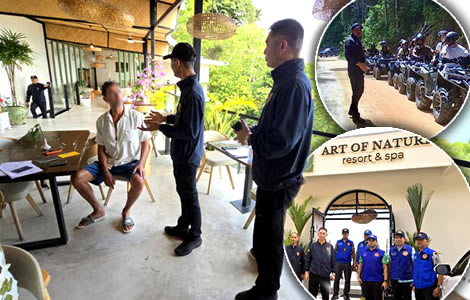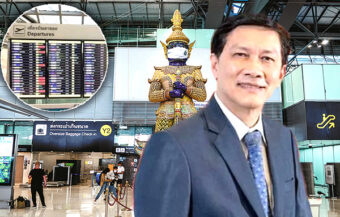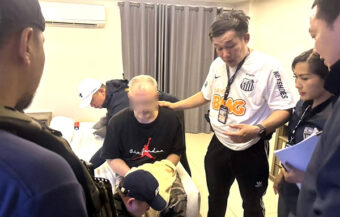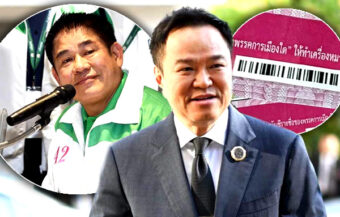Koh Phangan sees a dramatic crackdown as Thai authorities arrest German, French and Israeli nationals for running unlicensed hotels, restaurants and tours via Thai nominees. Government warns the era of “grey area” foreign control in tourism is over.
Thai authorities launched a fierce crackdown on Koh Phangan on Wednesday, raiding foreign-run businesses accused of hiding behind Thai nominees and fake licenses. Immigration and Tourist Police arrested German, French, and Israeli nationals in what officials called an unprecedented strike against illegal foreign control. The government’s message was blunt and unmistakable: the days of “grey area” business are over. Thailand welcomes fair investors—but will no longer tolerate foreign fronts, fake partnerships or quiet takeovers of Thai enterprises.

Thai authorities have launched a sweeping crackdown on illegal foreign business activity on Koh Phangan, arresting eight foreign nationals accused of secretly controlling hotels, restaurants, and tour operations. The October 15 raids marked one of the island’s largest coordinated enforcement actions in recent years.
The operation was led by Immigration Police and supported by Koh Phangan Police, Surat Thani Provincial Police, and Tourist Police. Officers acted after a series of local complaints about foreign operators using Thai “nominees” to disguise business ownership. Such arrangements are illegal under Thai law, which restricts foreign control in certain sectors.
Authorities said the raids were carried out across three properties and several tourist businesses. They focused on suspected nominee structures, unlicensed operations and illegal employment of migrant workers.
Raids reveal unlicensed resorts and illegal foreign operations shaking Koh Phangan tourism economy
The crackdown, they said, was part of a national policy to protect Thai tourism from unfair and unregulated competition.
At Laplage Resort, investigators arrested a 40-year-old French national identified only as Jody. Officers said he was managing the resort without a hotel license and employing a Myanmar worker without authorisation. The resort also lacked valid registration under the Hotel Act. According to Immigration Police, the site had been operating for months as an unregistered hotel catering mainly to European tourists.
In a separate raid, authorities inspected the Art of Nature Resort & Spa, where they detained a 60-year-old Israeli national named Avi. His hotel license had expired and still listed the old business name, “Viewpoint.” The property had since rebranded but failed to renew its official registration. Officers said Avi also employed two Myanmar workers beyond their legal work rights. Because of this, he now faces multiple charges related to improper licensing and illegal labour.
During the third raid, Immigration Police and Tourist Police entered the Shogun Ramen restaurant. Inside, they found two German nationals, Richard, 35, and Arthur, 38, running the kitchen with one Myanmar employee. There were no Thai workers at all.
Foreigners face shadow control and illegal labour accusations across the economy on Koh Phangan
According to investigators, Richard failed to report the employment of a foreign worker, as required by law. Both men are accused of working illegally and violating Thai business ownership restrictions. Officials said the restaurant served mostly foreign tourists and advertised mainly through online social media platforms in German and English.
Authorities said these arrests expose a growing pattern of foreigners exploiting loopholes to control businesses that should be Thai-owned. Many of these operators, they noted, use local intermediaries to register companies, lease property, and apply for business permits.
However, behind the paperwork, the foreigners handle daily operations, finances, and staffing decisions. Officials described the practice as “shadow control,” which deprives locals of opportunities and damages the island’s legitimate tourism economy.
Meanwhile, Tourist Police conducted a separate raid the same day on unlicensed ATV tour operators at the Thong Nai Pan nature trail. Officers arrested five guides—three Thai nationals and two Myanmar workers—who were leading tours without proper licenses. Police seized 11 ATVs and dune buggies valued at several million baht. The vehicles were impounded as evidence pending further investigation.
Israeli-linked tour firm under investigation for nominee schemes controlling Koh Phangan ATV tours
According to the Tourist Police, the guides worked for a company registered under a Thai woman whose Israeli husband allegedly runs the operation. The business mainly served Israeli customers through Hebrew-language signs, Facebook pages and mobile apps.
Investigators believe the Thai owner acted as a front, while her foreign husband managed the tours, staff, and finances. Officials said this was another example of nominee-based business activity designed to evade Thai ownership laws.
Authorities are now expanding their investigation into all related businesses. Financial and corporate records will be reviewed to determine ultimate ownership and possible money laundering links. Officials said they are particularly focused on tracing funds that may have been transferred offshore or disguised as rental income.
Tourist Police Commissioner Pol Lt Gen Saksira Phueakkham confirmed that the crackdown reflects a new enforcement directive targeting illegal foreign operations nationwide. He said Thailand welcomes legitimate foreign investors who comply with local laws. However, he warned that those using Thai nominees or unregistered employees will face strict penalties.
Thai law imposes penalties on unlicensed businesses and nominee schemes to protect tourism
Under Thai law, foreigners convicted of operating unlicensed businesses can face imprisonment, heavy fines, and deportation. Thai nationals who assist in nominee schemes can also face prosecution for aiding illegal ownership concealment. Authorities said that charges in these Koh Phangan cases will include violations of the Immigration Act, the Hotel Act, the Alien Employment Act, and the Tourism Business and Guide Act. Local officials stressed that these actions are meant to protect lawful business operators and preserve fair competition.
They also warned that unlicensed foreign-run establishments often avoid taxes, underpay workers, and undermine Thailand’s tourism reputation. Because of this, the government is intensifying checks on high-tourism islands such as Koh Samui and Koh Tao. According to the Surat Thani Provincial Police, the latest raids are only the beginning. Additional inspections are planned for properties suspected of hiding foreign ownership or using fake leases. Authorities said they will continue working with financial regulators to track nominee companies and identify their true beneficiaries.
Residents urged to report suspicious foreign businesses as authorities continue Koh Phangan crackdown
Residents of Koh Phangan have been urged to report suspicious activities, especially businesses that appear to be controlled by foreigners but registered under Thai names. Immigration officers said community cooperation is essential for effective enforcement.
As the investigations continue, the arrested suspects remain in custody while prosecutors prepare formal charges. Immigration officials said deportations are likely once the legal process is complete.
Arrogant Lebanese man held on Koh Phangan for illegal bike rental racket after being deported before
Crackdown on foreign business on Koh Samui using firms with nominees shareholders. Focus on villas
Officials on Koh Phangan launch inquiry after locals complain the island is becoming a second Tel Aviv
Officials emphasised that the crackdown demonstrates Thailand’s resolve to enforce its laws equally and protect the integrity of its tourism economy. “This island must remain a place of lawful enterprise, not a playground for illegal foreign business,” one senior officer said. “We will not tolerate those who exploit our hospitality or our legal system.”
With more raids expected in the coming weeks, Koh Phangan’s once carefree image faces a new test—one defined by law, order, and accountability rather than unchecked foreign control. The scale and nature of this crackdown is disturbing for many long-term business owners on Koh Phangan and Koh Samui of foreign origin.
The crackdown, which has been linked to the new interim government, appears to be more than a simple photo-op exercise by local law enforcement. The message is increasingly clear: Thailand’s business and administrative laws, which exclude foreign control in certain sectors, will be enforced—not only the letter of the law, but its spirit as well.
Join the Thai News forum, follow Thai Examiner on Facebook here
Receive all our stories as they come out on Telegram here
Follow Thai Examiner here
Further reading:
Arrogant Lebanese man held on Koh Phangan for illegal bike rental racket after being deported before


















